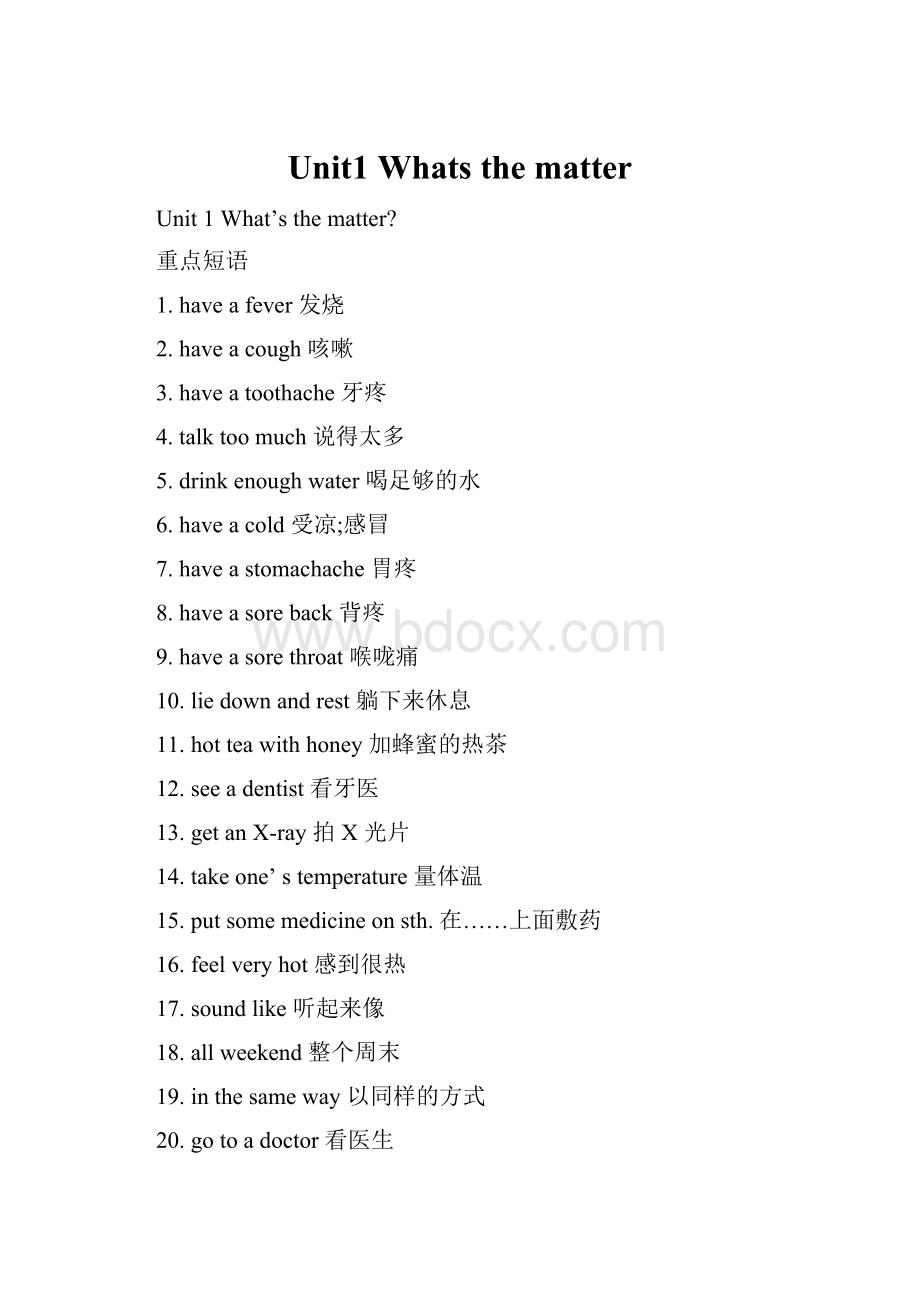Unit1 Whats the matter.docx
《Unit1 Whats the matter.docx》由会员分享,可在线阅读,更多相关《Unit1 Whats the matter.docx(14页珍藏版)》请在冰豆网上搜索。

Unit1Whatsthematter
Unit1What’sthematter?
重点短语
1.haveafever发烧
2.haveacough咳嗽
3.haveatoothache牙疼
4.talktoomuch说得太多
5.drinkenoughwater喝足够的水
6.haveacold受凉;感冒
7.haveastomachache胃疼
8.haveasoreback背疼
9.haveasorethroat喉咙痛
10.liedownandrest躺下来休息
11.hotteawithhoney加蜂蜜的热茶
12.seeadentist看牙医
13.getanX-ray拍X光片
14.takeone’stemperature量体温
15.putsomemedicineonsth.在……上面敷药
16.feelveryhot感到很热
17.soundlike听起来像
18.allweekend整个周末
19.inthesameway以同样的方式
20.gotoadoctor看医生
21.goalong沿着……走
22.onthesideoftheroad在马路边
23.shoutforhelp大声呼救
24.withoutthinkingtwice没有多想
25.getoff下车
26.haveaheartproblem有心脏病
27.toone’ssurprise使.......惊讶的
28.thanksto多亏了;由于
29.intime及时
30.savealife挽救生命
31.getintotrouble造成麻烦
32.rightaway立刻;马上
33.becauseof由于
34.getoutof离开;从……出萍
35.hurtoneself受伤
36.putabandageonsth.用绷带包扎
37.falldown摔倒
38.feelsick感到恶心
39.haveanosebleed流鼻血
40.cuthisknee割伤他的膝盖
41.putherheadback把她的头向后仰
42.haveproblemsbreathing呼吸困难
43.mountainclimbing登山运动
44.beusedtodoingsth.习惯做某事
45.runout(of)用完;用尽
46.sothat以便
47.so...that如此……以至于…
48.beincontrolof掌管;管理
49.inadifficultsituation在闲境屮
50.keepondoingsth.继续或坚持做某事
51.makeadecision做出决定
52.takerisks冒险
53.giveup放弃
一、基本知识点
1.What’sthematter(withyou)?
怎么了?
出什么事了?
What’s the trouble/ the problem / wrong with sb./ sth.?
2.Ihadacold.我感冒了。
haveacough咳嗽haveastomachache胃疼,肚子疼
haveatoothache牙疼haveaheadache头疼
3.身体部位+ache(疼痛)构成新的复合词
Stomach+ache=stomachachehead+ache=headache
tooth+ache=toothacheback+ache=backache
4.muchtoo+ 词,意为 ,too much+ 词,意为
5.enough【形容、副词】足够的/地,enough放在名词前,形容词、副词后面
goodenough足够好,enoughmoney=moneymoney
6.liedown躺下,lie躺,躺着,过去式lay;lie说谎,过去式lied
7.maybe“或许”,常用于句首,表示可能性,后加句子。
Maybeyouareright.
maybe,是情态动词+be的结构,意为“可能,也许”,后加名词、代词或形容词。
Hemaybeangry.
8.soundlike+名词、代词和从句:
Itsoundslikeyoudon’tknowthetruth.
Itsoundslikeagoodidea.
sound+形容词,“听起来,好像”,Themusicsoundsnice.
9.need需要,实义动词need+名词,需要某物;
needtodosth.需要做某事,主语通常是人,表示人主动的动作:
Youneedtolistencarefullyduringclass.
needdoingsth.主语通常是物,表示被动的动作:
Yourdirtyclothesneedwashing.
10.getoff(thebus)下(公交车)geton上车
11.agree同意,赞同;同意做某事观点。
12.trouble问题,麻烦;maketrouble
havetrouble(in)doingsth.=havedifficulties(in)doing
13.rightaway=rightnow=atonce,意为。
14.【复习】advice[不可数名词]劝告,建议,向…征求意见,givesb.adviceonsth.就某事给某人建议;
advise[动词]advisesb.doing
15.【复习】exercise动词意为,可数名词为,不可数时意为
16.hurt及物动词,使……疼痛,……受伤,不及物动词,……(部位)疼。
Hisleghurtbadly.
17.clean【动词】【形容词】,
cleaner意为
18.hit(用手或器具)打;击打Theboyhitthedogwithastone.
hitsb.onthehead/nose/back打某人的头、鼻子、后背,on用在所打较硬的部位;
hitsb.intheface/eye/stomach打某人的脸、眼睛、肚子,in用在所打较软的部位。
19.beusedtosth./doingsth.习惯于、适应了……、做某事,强调状态;
Hisgrandpawasusedtocountrylife.
Maryisnotusedtogettingupearlyinthemorning.
usedtosth./doingsth.“变得习惯,逐渐适应……”强调过程、动作:
It’sdifficultforonetogetusedtoanothercountry’shabit.
20.【复习】free[形容词]空闲的freetime;免费的thedrinkisforfree;自由的Iwanttobecomeafreebird.
free【动词】使……解脱,得到自由Hecouldnotfreehisarm.
21.runout用完,用尽
Whenhiswaterrunout,heknewthathewouldhavetodosomethingtosavehisownlife.
(物)sth.tunout.某物用尽了。
(人)sb.runoutof(物)sth..人用尽了某物。
Herunoutofallhismoneylastnight.
22.risk(sb.)todosth.冒险去做某事takearisk=takerisks冒险
23.theimportanceof(doing)sth.(做)某事的重要性
Westudentsshouldknowtheimportanceof(learning)English.
importancen.重要(性),importantadj.重要的,unimportantadj.不重要的
24.decision【名词】决定;抉择;
25.beinthecontrolof…掌管,管理
Theheadmasterisinthecontrolofthisnewschool.
beoutofcontrol无法控制,无法管理beundercontrol被控制住,在控制之中
26.【复习】mind意为“介意”Doyoumindmyopeningthewindow?
27.giveup(doing)sth.放弃(做)某事,giveup(playing)computergames;
giveup后可接名词、代词和动词ing形式,也可不接,如Nevergiveupeasily.
重点语法
1.with常见的用法
1)作为介词,意为“和…一起”,表伴随关系
Eg.IwenttoHongKongDisneylandwihmyparents.
2)表示“使用某种工具、手段”
Eg.Youcancutitwithaknife.
注:
“当单数名词+with+名词”用作主语时,其谓语动词应用单数形式。
Eg.AteacherwithhisstudentsisseeinganEnglishfilm
2.enough“足够的,充分的”
1)enough用作形容词作定语时,可修饰可数名词或不可数名词,可放在被修饰的名词前后均可。
如:
①Thereareenoughseats(seatsenough)forthemall.
有足够的座位让他们都坐下。
2)enough用作副词,可用来修饰形容词或副词,放在所修饰词的后面。
如:
①Hewalksslowlyenough.他走得够慢的了。
②Thisarticleisdifficultenoughtowrite.
3.描述身体不适
(1)主语+have/has+a+病症
(2)主语+have/has+a+部位-ache
(3)主语+have/has+a+sore+发病部位
(4)部位+hurt(s)
Eg:
1).Ihaveahighfever.我在发高烧。
2).IhadaheadachesoIwanttobed.我头疼,所以上床睡觉了。
3).Ihaveasorethroatandmychesthurts.我嗓子疼,胸口也疼。
4.hit“碰击,击中,碰撞”
hit+sb.+介词+the+身体部位(in用于涉及身体表面较软或较空的部位,如
eye,face,chest,leg.on用于身体较硬的部位,如head,nose,back)
区别hit和beat
1)hit(碰击,击中,碰撞)强调一次性动作
Eg.Theballhithimintheface.
2)beat“打,敲,接连打击”强调重复行的动作
Eg.Hisheartbeatsvioletly.他的心剧烈地跳着。
5.关于ues的用法
1)be/getusedtodosth.习惯于做某事
Eg.Iamusedtogettingupearly.
2)beusedtodosth.被用来做某事
Eg.Thisknifeisusedtocutbread.
3)usedtodosth.“过去常常做某事”
Eg.Iusedtogofishinginthepoolinfrontofmyhouse.
4)beusedfordoingsth.“用于/被用来做某事”
Eg.Thewoodisusedformakingpaper.
6.wear/puton/dress/haveon/(be)in
1)wear是“穿着”,“戴着”的意思,可用于穿衣、穿鞋、戴帽子,戴手套、佩戴首饰等,强调状态。
Eg.Childrenlikewearingnewclothes.
2)puton指“戴上”,“穿上”,为动态,表示穿衣服的动作,其反义词是takeoff。
Eg.Putonyourclothes穿上衣服
3)dress可作及物动词,有“穿着”,“打扮”的意思,为动态,但宾语通常是人,或反身代词,常用于被动语态但只用于穿衣,它既表示动作,又表状态。
常用于下列结构:
dresssb/oneself(给某人穿衣服)、dresswell和bedressedin等
Eg.Jimisn'toldenoughtodresshimself.吉姆太小,还不能给自己穿衣服。
4)haveon是“穿着”的意思,指穿的状态,和wear类似,但haveon不用于进行时态。
Eg.Shehasaredskirton.(=He’swearingaredskirt.)她穿着红裙子。
5)bein+表示颜色或衣服的词是系表结构,为静态,强调“穿着”“戴着”的状态。
Eg.Thegirlinwhiteismybestfriend.穿着白色衣服的女孩是我最好的朋友
7.oneof……之一…
oneof后接名词或代词得复数形式。
当“oneof+名词复数”在句中作主语时,其中心词为one,故其后的谓语动词要用第三人称单数形式。
Eg.Ihavemanybooks.HarryPotterisoneofthem.
如果名词前有形容词修饰,则用形容词的最高级形式,构成“oneofthe+最高级…”结构,表示“…中最…之一”
Eg.YUDanisoneofthemostpopularprofessorsinChina.
8.oneself反身代词构成的短语;
hurtoneself伤了自己byoneself独自地,单独地
enjoyoneself玩的愉快foroneself亲自,为自己
lookafteroneself照顾自己helponeself(to)请随便(吃、喝)teachoneself=learnbyoneself自学
leavesb.byoneself把某人单独留下
9.时间介词(at,in,on)
1.at指时间表示:
(1)时间的一点、时刻等。
如:
atnoon,atmidnight,atteno’clock,atdawn
(2)较短暂的一段时间。
可指某个节日或被认为是一年中标志大事的日子。
如:
atNewYear,attheSpringFestival,atnight
2.in指时间表示:
(1)在某个较长的时间(如世纪、朝代、年、月、季节以及泛指的上午、下午或傍晚)内。
如:
in2004,inMarch,inspring,inthemorning,intheevening,intheeighteenthcentury.etc
(2)在一段时间之后。
一般情况下,用于将来时,谓语动词为瞬间动词,意为“在...以后”。
如:
Hewillarriveintwohours.
谓语动词为延续性动词时,in意为“在„„以内”。
如:
Theseproductswillbeproducedinamonth.注意:
after用于将来时间也指一段时间之后,但其后的时间是“一点”,而不是“一段”。
如:
Hewillarriveaftertwoo’clock.
3.on指时间表示:
(1)具体的时日和一个特定的时间,如某日、某节日、星期几等。
如:
OnChristmasDay(OnMay4th),therewillbeacelebration.
(2)在某个特定的早晨、下午或晚上。
如:
Hearrivedat10o’clockonthenightofthe5th.
(3)准时,按时。
如:
如:
Ifthetrainshouldbeontime,Ishouldreachhomebeforedark.
10.runout(of)用尽,耗尽
runout表示“被用完了”的被动含义,其主语通常是时间、金钱、食物等无生命名词。
如:
Hismoneysoonranout.他的钱很快就花完了。
runoutof表示“用完(useup)”的主动含义,主语是人。
如:
Heranoutoftheroom.他跑出了房间。
三、1.What’sthematter?
=What’sup?
怎么了?
What’sthematterwithyou?
=What’sthetroublewithyou?
=What’swrongwithyou?
=Whathappened?
=Isthereanythingwrongwithyou?
你怎么了?
2.语法:
should“应该,应当”为情态动词,后接动词原形,没有人称和数的变化。
用来向别人提出建议,以劝导别人,比must和oughtto更加委婉。
主语+should/shouldn’t+动词原形...
①Youshouldliedownandrest.
你应该躺下休息一会儿。
②Youshouldn’tgooutatnight.
你晚上不应该出去。
③Whatshouldshedo?
她该怎么办呢?
④ShouldItakemytemperature?
我应该量一下体温吗?
【同步练习】
一、用所给词的正确形式填空
1.MothersaysIshouldstopplayingcomputerand__________(rest)
2.Doyoutake_________(you)temperature?
3.Ifyoucutyourself,youshould_________(put)somemedicineonit.
4.He______(get)offandhelpedtheblindmancrosstheroad.
5._________(thank)toMr.Wangandthepassengers,thedoctorssavedthemanintime.
6.DidMarycut________(she)?
Yes,shedid.
7.To________(he)surprise,greatchangeshavetakenplaceinChinathreeyears.
8.—DoIneed________(see)adoctor?
—No.Youneedn’t________(see)adoctor.
9.Mr.Green_______(leave)hereamomentago.
10.Someteenagersareafraidof________(take)riskswhichisnotgoodfortheirfuture.
11.Soheusedhisknife_______(cut)offhalfhisrightarm.
12.Doctorsoftentellus___________(drink)morewatereveryday.
13..Couldyougivemesome_____________(advice)aboutmymath?
14.________(noteat)toomuchtofu.
15.Thereissomethingwrongwithyourthroat.You’dbetter_______(drink)lotsofwater.
16.Let’sthinkaboutitbeforewefind______(us)“betweenarockandahardplace.
17.It’simportantforus_____________(keep)ingoodhealth.
18.Hehasaheadache.Heshould_____________(go)tobedearly.
19.Afterthat,Aronclimbeddownthemountain_____(find)help.
20.Ihavea_____________(tooth).Ihavetoseethedentist.
21.Weneedtime_____________(exercise)atschool.
22.Hewasnotready_______(die)thatday.
23.Ibrushmy_____________(tooth)everymorningandnight.
24.Weshouldexerciseeverydaytostay___________(health).
25.Heisgettingbetteraftertakingsome_____________(medicine).
26.Idon’tfeel_____________(good).IthinkIhaveacold.
27.Jackhurthisback________(play)football
28.__________(make)gooddecisionsisextremelyimportantwhenweareindanger.
二、单项选择.
()1.